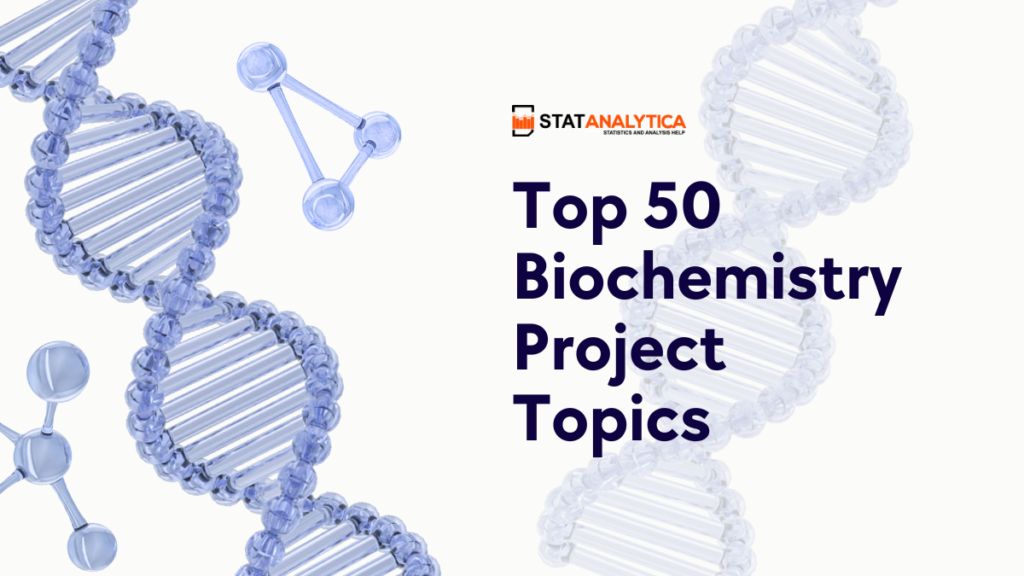Biochemistry is the cornerstone of comprehending life’s basic chemical processes within living organisms. With its interdisciplinary nature, biochemistry encompasses a vast array of topics, each offering unique insights into the intricacies of biological systems. In this blog, we’ll embark on a journey through various biochemistry project topics, shedding light on their significance and potential impact.

How To Select Biochemistry Project Topics?
Table of Contents
Selecting a biochemistry project topic can be an exciting yet daunting task. Here are some steps to help you navigate the process and choose the right topic for your interests and goals:
- Assess Your Interests and Goals: Start by reflecting on your interests within the field of biochemistry. Are you fascinated by metabolic pathways, molecular biology, or environmental biochemistry? Consider your long-term goals, whether they involve pursuing a career in research, academia, or industry.
- Explore Current Trends and Research Areas: Stay updated on the latest advancements and trends in biochemistry by reading scientific journals, attending seminars, and following researchers in the field. Identify emerging areas of interest or unresolved questions that intrigue you.
- Consider Your Skills and Resources: Evaluate your skills, background knowledge, and available resources when selecting a project topic. Select a topic that matches your skills and resources, ensuring it’s manageable within your time frame, equipment availability, and mentorship access.
- Consult with Mentors or Advisors: Seek guidance from professors, mentors, or advisors who can provide insight and advice on selecting a project topic. They can offer valuable perspectives based on their expertise and experience in the field.
- Brainstorm Potential Topics: Brainstorm a list of potential project topics based on your interests, goals, and the input you’ve gathered from mentors and advisors. Consider both broad topics and specific research questions that intrigue you.
- Narrow Down Your Options: Evaluate each potential topic based on factors such as its relevance, novelty, feasibility, and potential impact. Narrow down your options to a few promising topics that you feel passionate about and that align with your goals.
- Research Each Topic: Conduct preliminary research on each selected topic to gain a deeper understanding of the existing literature, key concepts, and potential research directions. Identify gaps or areas where further investigation is needed.
- Consider Collaborative Opportunities: Explore opportunities for collaboration with other researchers, laboratories, or institutions that may offer resources, expertise, or access to specialized equipment needed for your project.
- Seek Feedback: Once you’ve narrowed down your options, seek feedback from mentors, peers, or other experts in the field. They can provide valuable insights and help you refine your project topic before moving forward.
- Make a Decision: Based on your research, reflections, and feedback, make a final decision on your biochemistry project topics. Choose a topic that inspires you, aligns with your interests and goals, and has the potential to contribute to the advancement of knowledge in the field.
Top 50 Biochemistry Project Topics: Category Wise
General Biochemistry
- Elucidating the Mechanisms of Enzyme Catalysis
- Investigating Cellular Metabolic Pathways: From Glycolysis to Oxidative Phosphorylation
- Analysis of Biomolecular Structures: Proteins, Nucleic Acids, Lipids, and Carbohydrates
- Understanding the Role of Biochemical Signaling in Cellular Communication
- Biochemical Basis of Drug Action and Pharmacokinetics
Molecular Biology
- Regulation of Gene Expression: Transcriptional and Post-transcriptional Control Mechanisms
- Genome Editing Technologies: CRISPR-Cas9 and Beyond
- Molecular Mechanisms of DNA Replication and Repair
- Protein Synthesis and Folding: From Ribosome to Functional Protein
- Investigating RNA Biology: Structure, Function, and Regulation
Metabolic Biochemistry
- Regulation of Cellular Metabolism: Hormonal and Nutritional Control Mechanisms
- Biochemical Pathways in Disease: Metabolic Disorders and Dysregulation
- Lipid Metabolism: Biosynthesis, Breakdown, and Regulation
- Molecular Basis of Diabetes Mellitus: Insights into Pathogenesis and Therapeutic Strategies
- Metabolomics: Profiling Metabolic Changes in Health and Disease
Biochemical Techniques
- Chromatographic Techniques in Biochemistry: Principles and Applications
- Spectroscopic Methods for Biomolecular Analysis: UV-Vis, Fluorescence, and NMR Spectroscopy
- Mass Spectrometry in Proteomics: Advances in Analytical Methods and Data Interpretation
- Structural Biology Techniques: X-ray Crystallography, Cryo-EM, and Nuclear Magnetic Resonance (NMR)
- Applications of Bioinformatics in Biochemistry: Sequence Analysis, Protein Structure Prediction, and Systems Biology
Health and Medicine
- Biochemical Markers of Disease: Diagnostic and Prognostic Applications
- Pharmacogenomics: Personalized Medicine and Drug Response Prediction
- Cancer Biology: Molecular Mechanisms and Therapeutic Targets
- Neurochemistry: Understanding the Biochemical Basis of Brain Function and Dysfunction
- Immunology and Biochemistry: Intersections in Immune Cell Signaling and Regulation
Environmental Biochemistry Project Topics
- Bioremediation of Environmental Pollutants: Microbial and Enzymatic Approaches
- Biogeochemical Cycling of Nutrients: Nitrogen, Carbon, and Phosphorus Cycling in Ecosystems
- Environmental Toxicology: Molecular Mechanisms of Toxicity and Detoxification
- Climate Change and Biochemistry: Impacts on Global Biogeochemical Cycles
- Biofuels and Renewable Energy: Harnessing Biomass for Sustainable Energy Production
Emerging Trends
- Systems Biology Approaches in Biochemistry: Integrating Omics Data for Holistic Understanding
- Synthetic Biology: Designing and Engineering Biological Systems for Novel Applications
- Nanotechnology in Biochemistry: Applications in Drug Delivery, Imaging, and Sensing
- Biochemical Engineering: Bioprocess Optimization and Bioreactor Design
- Bio-inspired Materials: Mimicking Nature for Innovative Biomaterials and Devices
Biotechnology and Industry
- Industrial Enzymes: Production, Optimization, and Applications in Biocatalysis
- Biopharmaceuticals: Development, Production, and Quality Control
- Bioreactor Design and Scale-up: Challenges and Solutions in Bioprocess Engineering
- Biosensors and Bioanalytical Techniques: Rapid Detection and Quantification of Biomolecules
- Bio-based Materials: Sustainable Alternatives for Packaging, Textiles, and Construction
Food and Nutrition
- Nutritional Biochemistry: Understanding the Biochemical Basis of Nutrient Requirements
- Food Processing and Biochemistry: Impact on Nutrient Composition and Bioavailability
- Functional Foods and Nutraceuticals: Bioactive Compounds and Health Benefits
- Nutrigenomics: Interactions between Diet, Genetics, and Health
- Food Allergies and Intolerances: Molecular Mechanisms and Diagnostic Tools
Agricultural Biochemistry
- Plant Biochemistry: Metabolic Pathways and Secondary Metabolites
- Biochemical Basis of Crop Improvement: Breeding for Stress Tolerance and Nutritional Quality
- Soil Biochemistry: Nutrient Cycling, Microbial Communities, and Soil Health
- Plant-Microbe Interactions: Signaling Pathways and Defense Mechanisms
- Biofortification
: Enhancing Nutritional Quality of Crops through Genetic and Agronomic Approaches
Tips To Make Biochemistry Projects
- Choose an Engaging Topic: Select a biochemistry topic that interests you and aligns with your goals. Consider its relevance, novelty, and potential impact on the field.
- Define Clear Objectives: Clearly define the objectives of your project, including the research questions you aim to answer and the hypotheses you plan to test.
- Conduct Thorough Literature Review: Familiarize yourself with the existing literature on your chosen topic. Identify gaps in knowledge, conflicting findings, and areas for further investigation.
- Design Experimental Protocols: Develop detailed experimental protocols outlining the procedures, materials, and equipment needed to conduct your research. Consider potential variables, controls, and replicates to ensure the validity of your results.
- Acquire Necessary Skills: Acquire the necessary laboratory skills and techniques required for your project. Seek guidance from mentors, attend workshops, and practice hands-on training to develop proficiency in biochemical methods.
- Adhere to Safety Guidelines: Prioritize safety in the laboratory by following standard operating procedures, wearing appropriate personal protective equipment, and handling hazardous materials with caution.
- Collect Data Systematically: Conduct experiments meticulously, recording data accurately and consistently. Keep detailed records of your observations, measurements, and experimental conditions for later analysis.
- Analyze Data Effectively: Use appropriate statistical methods and software tools to analyze your data effectively. Interpret your findings critically, identifying trends, correlations, and significant results.
- Communicate Your Findings: Present your research findings clearly and concisely through written reports, oral presentations, and visual aids such as posters or slides. Tailor your communication to your target audience, whether it’s fellow researchers, educators, or the general public.
- Seek Feedback and Collaboration: Solicit feedback from peers, mentors, and experts in the field to refine your project and address any challenges or limitations. Consider collaborating with other researchers or laboratories to leverage resources and expertise.
- Stay Organized and Manage Time: Stay organized throughout the project timeline, setting milestones, deadlines, and priorities. Break down large tasks into smaller manageable steps and allocate time effectively to meet project goals.
- Reflect and Iterate: Reflect on your project experience, including successes, setbacks, and lessons learned. Identify areas for improvement and consider how you can refine your approach in future projects.
Conclusion
In conclusion, biochemistry offers a diverse range of captivating topics, spanning molecular biology, metabolic pathways, and applications in various fields.
By following the outlined tips, researchers can navigate project selection, planning, and execution effectively. Embrace curiosity, collaboration, and continuous learning to make meaningful contributions to scientific understanding.
With dedication and passion, biochemistry projects have the potential to drive innovation and shape the future of healthcare, environmental sustainability, and beyond.


